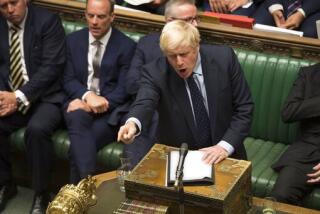BRITAIN : Battle Erupts Anew Over EC Commitment
- Share via
LONDON — The ruling Conservative Party is undergoing a wrenching argument--once again--over the degree of Britain’s commitment to the European Community and its plans for political union.
The fight pits the Tory party’s moderate, pro-Europe wing led by Prime Minister John Major, against the Thatcherites, followers of former Prime Minister Margaret Thatcher, who oppose closer EC political union.
In the view of many political observers here, the battle will be a key test of the leadership of Major, who took over a year ago from Thatcher after she was deposed by her party leaders, partly as a result of her antagonism to the EC.
The controversy has been building for weeks as drafts of a new EC treaty on economic and political union have circulated among the 12 member nations. The drafts will be up for approval at next month’s summit in Maastricht, the Netherlands.
Major has called for a full-scale, two-day debate in Parliament next week on Britain’s attitude toward an EC political and economic union.
Leading political figures such as Major, Thatcher, former Prime Minister Edward Heath, former Foreign Secretary Geoffrey Howe, former Chancellor of the Exchequer Nigel Lawson and former Cabinet minister Norman Tebbit, as well as opposition party leaders, are all scheduled to speak.
A top Major aide said that the prime minister’s strategy is designed “to give the Parliament a say, a debate, a vote--before Maastricht, not after.”
The aide added that, in effect, Major will be asking the House of Commons for a vote of confidence in whatever compromises he decides will be needed at the EC summit “to keep Britain at the heart of Europe.”
Major’s view, as he has said, is: “You can’t influence Europe’s future from the terraces (stands). You have to be on the pitch (field) and playing hard.”
It is not yet clear what role Thatcher will choose to play in the debate; but in a speech Thursday in Memphis, Tenn., she declared that a single currency would undermine democracy in EC member states, and she opposed shifting more powers to the European Commission, the EC’s executive body.
“It is not only removing the rights of (national) politicians, but it is people’s rights being taken away,” she said. “The people have the right to hold their politicians accountable at the ballot box. To me, removing the people’s rights is wrong and I shall fight it.”
Her supporters hope she will speak out against getting Britain into a position where the nation would have to yield some sovereignty to the European Parliament.
But by opposing Major’s more conciliatory attitude toward a tighter European Community, Thatcher may risk dividing the party and making it highly vulnerable in the coming national election, which Major must call by next July.
Neil Kinnock’s opposition Labor Party generally favors close ties with the EC and is quietly smiling at the fractiousness of the rival Tories.
During the week, several salvos were fired by opposing Tory politicians.
Nigel Lawson warned of the perils of European monetary and political union.
But in a parliamentary party ballot, Sir Norman Fowler, one of Major’s stalwarts, ousted Thatcherite William Cash, an anti-European federalist, as chairman of the party’s European Affairs Committee.
The voting took place in a small committee room where Conservative parliamentarians got involved in an unseemly scramble for votes. Furious lawmakers called the scene “shambolic,” “near pandemonium” and a “disgrace.”
“It was like a roomful of imbeciles,” reported lawmaker Geoffrey Dickens.
Much of next week’s debate is expected to center on what many are calling “the F word”--federalism.
The word keeps slipping in and out of the various draft texts for EC treaty revisions to be voted on at Maastricht. The British are fiercely opposed to calling closer political union “federalism,” because they say that it has never been clearly defined by EC members and could be used to subvert national parliamentary sovereignty.
But a closer federal concept is dear to the heart of the Germans and other EC members.
However, in the horse-trading going on at various EC meetings, the “F word” may well be removed, making Major’s task of accommodation much easier at the summit--as well as strengthening his party in the coming political campaign.
More to Read
Sign up for Essential California
The most important California stories and recommendations in your inbox every morning.
You may occasionally receive promotional content from the Los Angeles Times.













